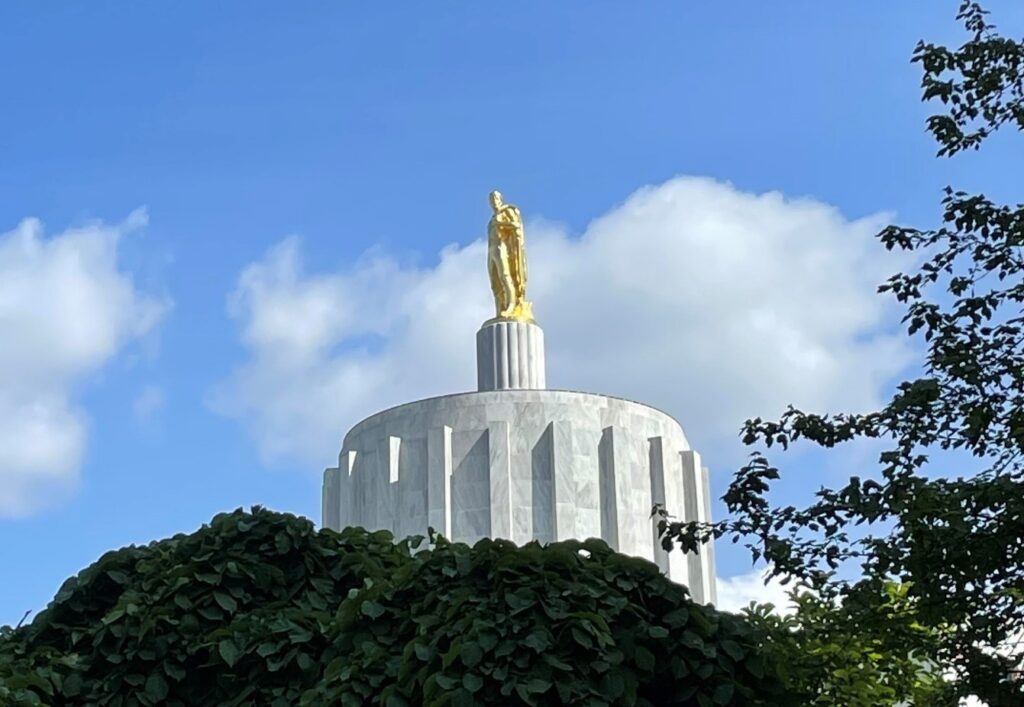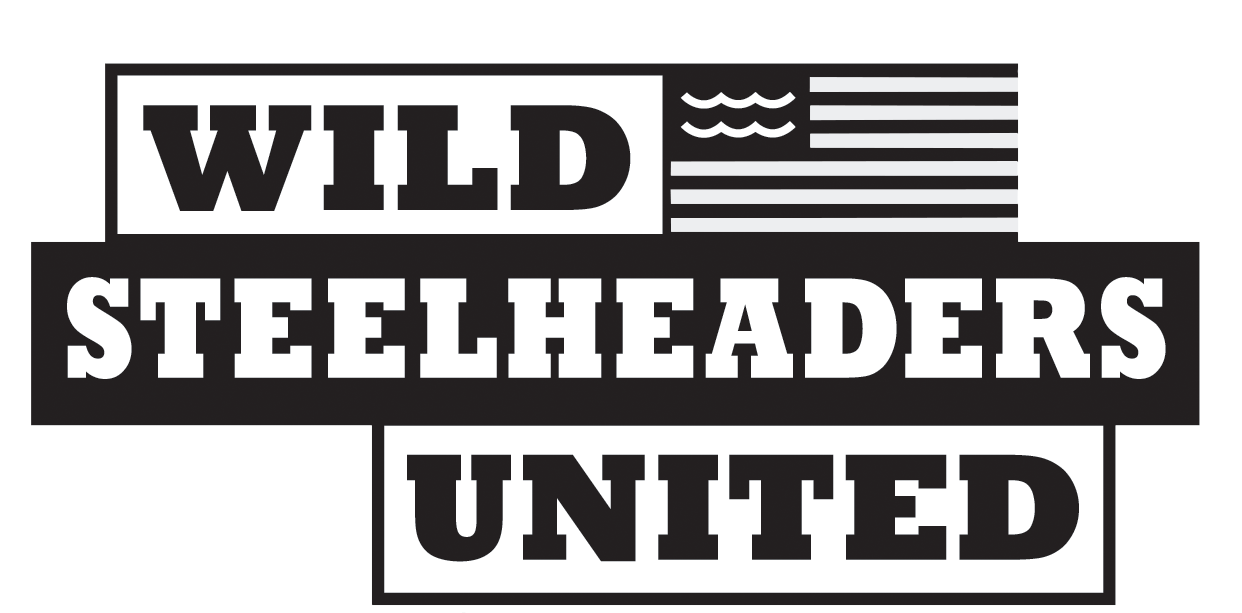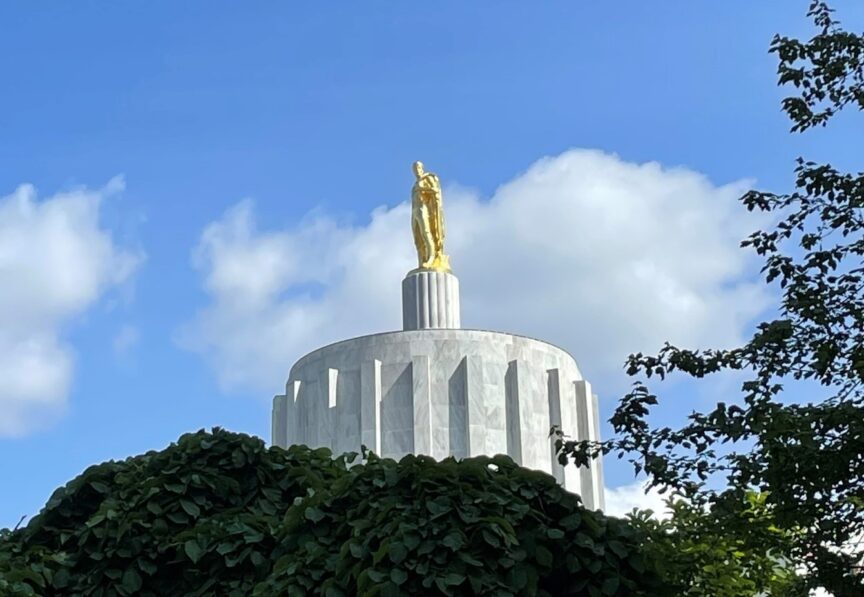
The Oregon Legislature recently completed its dramatic 2023 legislative session. Trout Unlimited and Wild Steelheaders United are pleased to report that the Legislature passed some tremendous policy and budget measures for fish and rivers this year (many of which are still waiting for the Governor’s signature), while also not advancing some highly problematic proposals!
Split Season Instream Leases and Non-Native Fish Management
As we reported in this May blog post, the Legislature passed two of our priority bills early in the session:
House Bill 3164 permanently authorizes Oregon’s “split season” instream lease program. In July, August, and September, stream flows are often at their warmest and lowest conditions of the year. In certain streams, this can create inhospitable conditions for Spring Chinook, summer steelhead, Coho Salmon, and bull trout during their fall spawning migrations. Split season water leases authorize “split” use of a water right within a single season, allowing the water right holder to use the water for a portion of the year, and then lease the water to a third party for instream use during the same season. This bill means Trout Unlimited and partners—including landowners—can continue using this valuable program to provide ecological uplift for wild fish during the season when they need it most.

Above: Trout Unlimited holds split season leases on the Lostine River (pictured) during the late summer season, primarily to benefit Spring Chinook. The Nez Perce Tribe monitors fish populations at its weir shown here. Summer steelhead, coho, and bull trout also use the habitat, which connects the Grande Ronde to spawning areas in the Wallowa Mountains. Image: Trout Unlimited.
House Bill 2966 grants Oregon Department of Fish and Wildlife (ODFW) greater flexibility to manage non-native fish species to benefit native fish species. Non-native game fish (such as smallmouth bass, walleyes, and striped bass) can pose a serious threat to juvenile steelhead, salmon and other native fish. The problem is particularly acute in certain waterbodies, such as the Coquille River, where illegally stocked smallmouth bass have caused a precipitous decline in the Fall Chinook population. Under the bill’s authority, ODFW will have greater flexibility to reduce the harmful effects of those species on native fish populations by allowing ODFW to (1) permit fishing contests that remove non-native game fish from Oregon waters, and (2) waive statutory protections for non-native game fish (such as the “waste” restriction) if beneficial to native species.
Injunctive Authority for Water Violations
In the final hours of the session, the Legislature passed another one of our top priority policy bills: HB 2929.
This measure grants the Oregon Water Resources Department (OWRD) authority to apply for an injunction to quickly remedy extreme cases of illegal water use or water storage. WRD is responsible for enforcing Oregon’s water laws on the ground. In recent years, WRD has documented some egregious instances of water use and storage done without water rights, including construction of illegal reservoirs (as shown in the photo), illegal dams, and diversion of fish-bearing streams into illegal ponds. These illegal water withdrawals can harm salmon, steelhead and other native fish.

Responding to illegal water use and storage in cases like these is a time-sensitive matter for fish. Remarkably, WRD does not currently have statutory authority to obtain the form of legal remedy that would quickly cure these instances of extreme violations (i.e., an injunction). This bill grants that authority for an initial six-year period. We expect this new authority to protect native fish in these rare cases of extreme, illegal behavior. Trout Unlimited and Wild Steelheaders United greatly appreciate chief sponsor Representative Pam Marsh and sponsor Senator Jeff Golden for shepherding this bill through the session.
Drought Package, Agency Budgets, and Tax Incentives
State programs that support wild steelhead, salmon, lamprey and other native fish can be dramatically affected by line items in budget bills. In the 2023 session, Representatives Ken Helm and Mark Owens assembled a “drought package” that provided one-time funding to many natural resource agency programs, which served as a boost to some key initiatives for wild steelhead.
TU advocated in support of the following, all of which were included in appropriations or omnibus packages this session (and many of which were not included in the Governor’s Recommended Budget that was released at the beginning of session):
- $8.75 million to ODFW as grants for fish passage projects during the 2023-2025 biennium (HB 5030)
- $303,000 for the Klamath Fish Reintroduction Coordinator at ODFW—and conversion of the position from limited duration to a permanent position—to help ensure a positive fish response to dam removals in the Klamath (SB 5509)
- $1.8 million in ODFW’s budget for increased stream temperature and real-time streamflow monitoring, coldwater refugia studies, and staff capacity for instream flow studies (SB 5509)
- $1 million to the Oregon Conservation and Recreation Fund at ODFW, to serve as grants for projects that improve drought resilience (SB 5509)
- Carryforward of $9.2 million in the Oregon Watershed Enhancement Board (OWEB) budget for voluntary water acquisition (e.g., instream water lease) projects (SB 5539)
- Carryforward of $27.8 million in OWEB budget for natural resource emergency response grants, many of which were awarded in the last biennium but not able to be implemented until the 2023-2025 biennium (SB 5539)
- $456,000 for additional watermaster capacity at WRD in the Klamath and Harney basins (HB 5043)
- $2.2 million for a new Water Availability Reporting System at WRD, to inform new water right permitting decisions based upon modern modeling and data (HB 5043)
- Express prioritization for irrigation modernization projects (per a $50 million appropriation to those initiatives in Oregon) that legally protect a portion of conserved water instream, thereby ensuring public benefit for public funding (HB 5030)
- Authority for WRD to require an entity that measures water use or storage to also report the measured use to the department (HB 2010)
- 6-year extension of the state tax credit for fish screening devices that protect against entrainment of trout and salmon in diversion facilities (originally in SB 130, passed in tax omnibus bill)

Beavers and Wildlife Habitat
The legislature also passed two bills that should improve conservation of healthy, functioning riparian areas in Oregon.
HB 3464 moves all management responsibilities for beavers in Oregon to ODFW, replacing a system under which ODFW and the Oregon Department of Agriculture split jurisdiction of the species based on the issue. The bill is intended to increase usage of coexistence strategies to resolve certain wildlife conflicts, thereby leaving more beavers alive on the landscape (which then provide fish habitat and healthier riparian areas). Importantly, the bill still allows lethal removal of beavers in response to certain damage and in the instance of imminent harm to infrastructure.
HB 2527 provides modest new flexibility to ODFW in administering its primary program to incentivize habitat restoration and conservation on private lands. The Wildlife Habitat Conservation and Management Program (WHCMP) offers a property tax incentive to landowners that enroll their properties in WHCMP and implement wildlife habitat management plans (which Oregon law expressly contemplates including efforts to improve water quality, protect and restore fish and wildlife habitats, recover listed fish species, and enhance streamflows). HB 2527 reduces ODFW’s administrative burden in overseeing WHCMP, which should allow the agency and partnering entities to increase the program’s usage in participating counties.
Bills We Opposed
While advocating for everything above that passed, we also played a lot of defense this session. Fortunately, many bills we opposed won’t reach the Governor’s desk.
The so-called “salmon credit” bill (HB 2206) was back after first airing during the 2022 legislative session. This bill would’ve streamlined the process for developing and destroying functioning salmon and steelhead habitat in one place, in the hopes that related mitigation projects elsewhere could fully offset that damage by creating replacement habitat anew.
There were also three separate bills that would’ve significantly undermined Oregon’s fish passage laws. Oregon law requires fish passage at new potential fish passage obstructions, and also requires barrier owners to install fish passage at existing barriers upon certain triggering events. HB 2164 would have exempted all dams or obstructions smaller than 15 feet across (e.g., any culvert) from the fish passage laws. It also would have exempted any obstruction from fish passage requirements if the obstruction provided “some” fish habitat, providing fish passage would be “cost prohibitive” to the owner, and the obstruction provided hydropower, drinking water, or irrigation water. HB 2165 would have exempted any dam or obstruction from having to provide fish passage if providing passage would “increase the cost of a project” by more than 10% and the state would not cover that cost. HB 2930 would have exempted the addition of a hydroelectric generator at Bowman Dam on the Crooked River (otherwise a triggering event for fish passage requirements) from the fish passage laws altogether. Fortunately, none of these proposals to undercut Oregon’s important fish passage laws received a hearing this session. We expect these proposals to chip away at important fish passage requirements to continue, and we’ll remain vigilant against those measures.
Lastly, HB 2765 would have granted a valuable (and highly unusual) exclusive right—to use and sell a portion of the Klamath River’s flow—to a wastewater treatment district. In Oregon, all water belongs to the public. This bill would have deemed all water treated and discharged by a certain district as effectively owned by the entity after the water left their facility. If this bill passed, the district would have been able to sell that increment of water to downstream entities (using the river as a conveyance system), while also placing that water off-limits to other downstream water users. Oregon law allows for the sale or re-use of “reclaimed” wastewater under a process that protects fish and wildlife; this bill would have circumvented that process entirely. Trout Unlimited and Wild Steelheaders oppose this concept in the Klamath and elsewhere in Oregon.
Summary
The policy and budget achievements of the 2023 legislative session will benefit wild steelhead and rivers in Oregon for years to come. If you have questions about the Oregon legislative session or where we’re headed now that session is over, please contact James Fraser, Oregon Policy Advisor at james.fraser@tu.org


